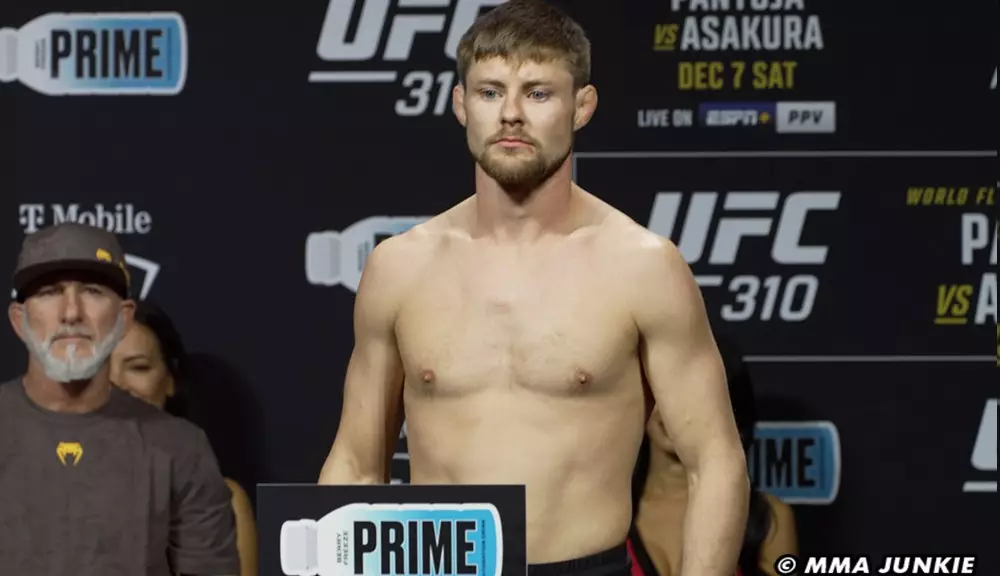In the realm of mixed martial arts (MMA), the athletes are often held to a high standard, not only for their physical prowess but also for the impact of their words. Recently, UFC featherweight Bryce Mitchell ignited a firestorm after making pro-Hitler comments during the inaugural episode of his podcast, “ArkanSanity.” His remarks, which included labeling Adolf Hitler as “a good guy” and denying the Holocaust, have reverberated through both the MMA community and the broader public discourse. This is more than just a passing controversy; it raises pivotal questions about accountability, the influence of public figures, and the response (or lack thereof) from promotional organizations like the UFC.
Despite the gravity of Mitchell’s comments, UFC CEO Dana White took a surprisingly lenient approach. At a recent press conference, White voiced the organization’s “beyond disgust” at Mitchell’s utterances but stopped short of taking direct action against him. This decision stirred debate about the UFC’s responsibility to protect its brand’s integrity while allowing freedom of speech. Critics, including prominent MMA figures like Chael Sonnen, argued that such comments cross a line that should trigger more than just a verbal reprimand. In an age where corporate accountability is paramount, the UFC’s non-response suggests a complex relationship between personal beliefs and professional conduct.
When athletes make offensive comments, the ramifications extend far beyond their immediate circle. Sonnen pointedly noted that in certain circles, there are “words that don’t work,” indicating a societal consensus on unacceptable phrases and ideologies. His personal anecdote about being reprimanded by a professor serves as a reminder that we must be vigilant in how we communicate, particularly as public figures. The legacy of such remarks transcends the sport; athletes have the potential to inspire or mislead millions. The exoneration of those who navigate through this minefield often creates an unsafe space for marginalized voices and can alienate fans who expect better from their heroes.
Market Reality: The Consequences for Sponsors
While the UFC opted for neutrality, repercussions are inevitable, especially regarding sponsorship and public relations. Sonnen emphasized the existence of “checks and balances” that would ultimately affect Mitchell’s career. Sponsors, who are increasingly sensitive to the political climate and public sentiment, may not ignore such damaging statements. They could very well distance themselves from Mitchell, leading to economic impacts—whether by freezing partnerships or outright severing ties. The fear of losing sponsorship deals often serves as a powerful motivator for athletes to tread carefully in the realm of public opinion.
Sonnen likened the potential growth stemming from these experiences to his own; he learned, albeit through critique, the importance of understanding the weight of his words. This transition from ignorance to awareness is crucial for Mitchell, too. It remains to be seen if he will reflect on the gravity of his comments and the historical context behind them. Sometimes the hardest lessons are learned publicly, but they can also lead to profound personal development. Every public figure has the opportunity to evolve from their missteps—if they choose to engage with constructive criticism rather than deflect or ignore it.
Bryce Mitchell’s controversial comments have opened up a larger conversation within the MMA community and beyond. As the public grapples with the implications of such remarks, the responsibility lies with not just the athletes but also with organizations like the UFC to foster a culture that prioritizes accountability and ethical dialogue. The fight against unacceptable ideologies considers both the individual and systemic responses from each stakeholder involved. In a sport that thrives on courage, embracing the challenge of confronting uncomfortable truths should be seen as an essential step forward. In the end, actions will speak louder than words in determining not only a fighter’s legacy but also the legacy of the sport itself.

